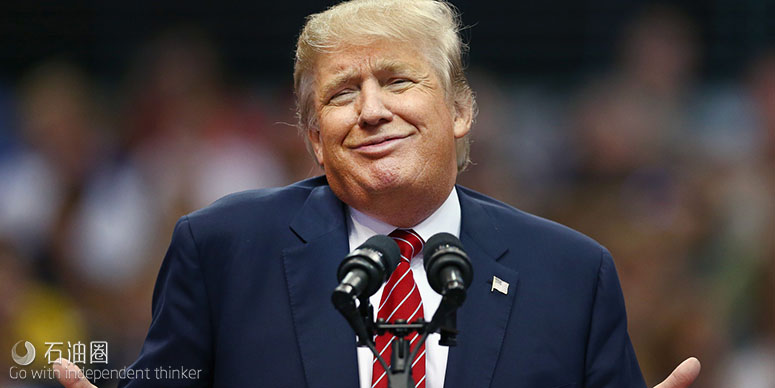Oil is hurting.
Coming into Monday, prices for oil have fallen seven of the last 10 sessions, leaving the cost of a barrel back below the $50 mark. The losses have stymied a modest recovery following a huge tumble that saw prices fall from well over $100 a barrel in May 2014 to less than $30 by January 2016.
The price of oil was down again on Monday.
Oil has traditionally been a major barometer for the U.S. and the world economy. And that makes oil’s fail a problem for Donald Trump. Stocks have traded up on the belief that Trump’s policies will provide a major bump to the economy. The price of oil, though, seems to suggest that that bump may not be coming as soon as stock market investors think.
But the drop in the price of oil may be more a factor of the new math of the crude market, and less about a signal where the economy is headed.
Part of the problem for oil producers is that there is an increase in supply. Global oil supplies rose by 260,000 barrels a day last month, bringing the total to 96.52 million barrels a day. U.S. producers are the culprits for the increase, which has caused domestic crude oil storage figures to surge recently. In total, the U.S. has 528.4 million barrels in storage, 7% higher than a year ago. And that excess supply doesn’t seem to be going away anytime soon. The U.S. is pumping out nearly 9.1 million barrels a day, the largest total in over a year. By comparison, Russia and Saudi Arabia produced 11.48 million and 9.98 million barrels a day in February, respectively.
To try to counteract the increase in U.S. production and drive up the oil prices, OPEC, Russia, and 10 other key non-OPEC countries made an agreement late last year to cut production for the first half of this year. The agreement worked to a certain extent, with prices rising up to and hovering around the $55 mark for the past few months. But the increase in price has also given U.S. producers a reason to pump out more oil, sending oil prices back down.Nonetheless, for President Trump, the oil slump could throw a monkey wrench into his plans for the economy. A huge part of his jobs plan has been infrastructure, with the energy industry being a crux of that. If prices remain low, oil producers won’t have much incentive to really ramp up production and hire more staff. OPEC and other countries can afford to produce cheap oil (even if they don’t like it) because they have low break-even points when it comes to oil production. U.S.
companies, though, don’t have that luxury. It’s more expensive to mine U.S. oil than in other places around the world, not just because of labor costs, but also because the type of oil coming out of the ground is different.
Wayne Kreis
With respects, The Trump Administration needs low priced oil since his plan is to create wealth through manufacturing jobs. Since we don’t have cheap labor, we must have low price oil. Wayne Kreis
Ruby King
Forbes.com has an interesting take on the recent demise of oil prices and connection to Trump. Trump loves to take credit for stock market gains but I doubt he will be mentioning the energy price collapse in his next Twitter tirade.
Patrick Kane
On the Oil price and energy development I agree that we will see strides forward as Trump is President . We may not see them right away but I believe Our industry will see a move forward. Just my Thoughts, I do not want to get everyone on a Political Rant
Rudy Bellinger
I’m not sure what an anti-global-trade policy, whatever its merits, would do to increase global oil consumption, so it’s hard to see how he would be the savior of the oil industry. Not weighing in on the policy itself – I’ve never been the biggest globalization fan – but I do see the price of oil being part of the collateral damage from “deconstructling” that system.
Michael Long
It doesn’t matter what Trump does or what OPEC does. Our Shale drillers will help keep the price low.
Ric Patras
@PatrickKane: We can’t be short-sighted on the topic of developing the oil and gas resources we already have, to say nothing of new drilling. We want long term energy independence from the ME and other foreign entities. In this case, Canada is almost a non-foreign source, because of the interconnections in place, and those being even further sharpened. Let’s not let political opinions get too involved in our group. From the current experience in the national discussion these past months, it would prove to be non-beneficial and fragmenting of the overall goal and mission of our group.
Mike Shellman
My point is that believing Trump can make world oil prices go up, which is what has to happen for things in our industry to improve, is a little like being a sardine in a bait ball. I want to know how. And he better get it done quick, before mid-terms, the way its going now. Now, the roof is on fire.
Marshall Tomlinson
The Trump incentive is an attempt to rise production, for energy Independence not to sway market pricing! Think long term not short term.
Andy Douglas
Forgive me – but here’s why it is crashing. Saudi Arabia has lied and has not cut a barrel.
Everyone is basing their data on what OPEC is reporting. However, the truth in the proverbial oil pudding is the export data or import data from/to other countries. Generally, no-one really knows how much Saudi, Kuwait, the UAE are producing. These are state secrets.
So don’t believe news articles that state otherwise.
Nigel Davis
Andy, it is always difficult to confirm whether the OPEC and NonOPEC affiliated countries have reduced production to the published levels, however what appears to be correct is that they have not increased their production. Had this status quo been maintained the ongoing increase in world consumption would have brought the inventories down and thus maintained the price. However – and there is always one of those – what was not factored into the equation was the the US (after screaming for help) would not play ball and cut/maintain their production. It is this excess that is preventing the using up of the stockpiles and, unfortunately as the stock tanks continue to fill, is leading to the slow decline in oil price.
As an industry in the present economic climate we cannot have out cake and eat it. Or to put it another way, it it somewhat fruitless to carry on winging about Saudi, Kuwait and UAR not cutting production when the US is doing the same. Or is this a case of one rule for the US and another for the rest of the worl
Matthias Kirchhoff
The oil price will no doubt go up as it can’t really go down any further and as Donald Trump will be POTUS for at least the next 3 years and 10 months there is a very good chance that this will happen under his presidency. What really drives the oil prive is risk. Risk to supply to be specific. At the moment there is no risk to supply at 50 $/bbl. Even at 40$/bbl enough oil can be produced economically TODAY. Investment in oil infrastructure will reduce further until a bunch of fields are shut in because there was no economic reason to keep investing and produce at a loss. Only when this happens will the oil price go up again. Or production in the KSA, Iran, Iraq, UAE is seriously threatened. When the market thinks they won’t get tomorrow’s barrel.


 石油圈
石油圈
